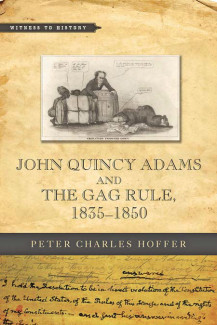
Johns Hopkins UniversityEst. 1876
America’s First Research University
Behind the Book: Peter Charles Hoffer Discusses his Motivations for Writing "John Quincy Adams and the Gag Rule"

I wrote this book because I wanted to teach how slavery infected every part of the national government. The term, the "slave power," was not just anti-southern rhetoric; it was the description of something very real. The most surprising thing I learned during the research for this book was how much of the national legislature's time was taken up in the attempt to suppress what was, at the time, a relatively minor political movement. Abolitionism was loud but few in the North and fewer in the South really believed that slavery could be ended in their lifetimes. But southern members of Congress and their allies in the North were petrified by the prospect. Their effort to prevent the reading of anti-slavery petitions was more vituperative than I had imagined. What this book brings to the scholarly discussion of slavery that is new, I hope, is the way that the gag-rule debates turned national politics from party to section; that is, from political party alignments that stretched across the North and the South to alignments that were almost entirely sectional--and this over a decade earlier than we thought. One could almost see secession approaching in the late 1830s. I hope my book finds its way into classrooms because in these days of divisive political rhetoric, the gag rule debates are an object lesson of what happens when one group of politicians tries to suppress basic constitutional freedoms. We need more men like John Quincy Adams today.

Peter Charles Hoffer is a distinguished research professor of history at the University of Georgia. He is the author of Sensory Worlds in Early America, Prelude to Revolution: The Salem Gunpowder Raid of 1775, and Law and People in Colonial America. His latest book is John Quincy Adams and the Gag Rule, 1835-1850


